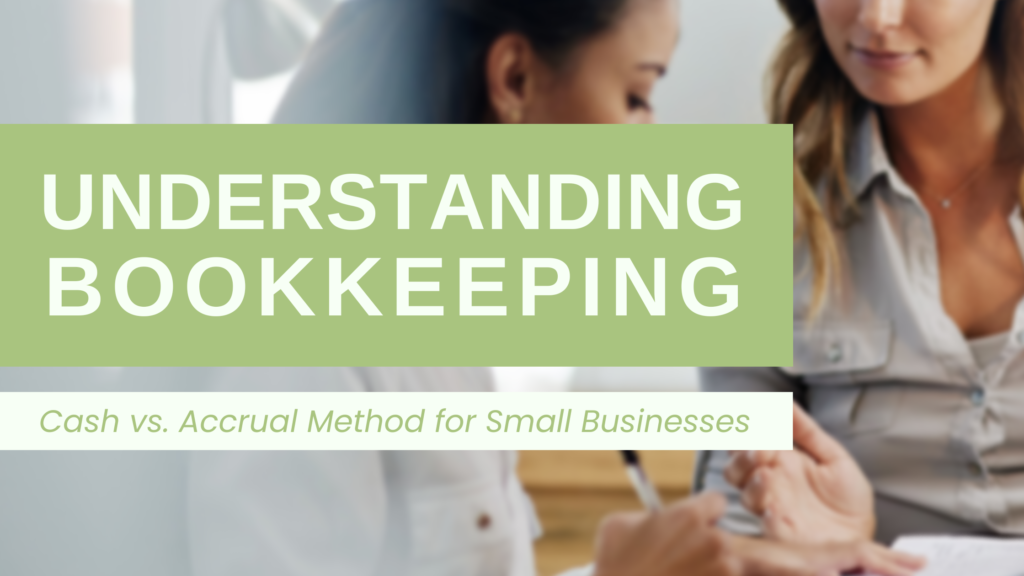
The difference between cash and accrual
Introduction to Bookkeeping Methods
When you start a small business, managing your finances is crucial for success. One of the first decisions you’ll face is choosing a bookkeeping method. The two most common methods are the cash method and the accrual method. Understanding the differences between these can help you make an informed decision that best suits your business needs. Let’s break down these concepts in simple language.
Cash Method: Simplicity and Immediate Financial Picture
What is Cash Method Bookkeeping?
The cash method of bookkeeping is straightforward: you record transactions when cash changes hands. This means you record income when you receive cash from your customers, and you record expenses when you pay out cash. It’s like your personal checkbook; you see what you currently have and what you’ve spent.
Benefits of the Cash Method
- Simplicity: The cash method is simple and intuitive. It’s easy to track when you don’t need to account for money you expect to receive or pay in the future.
- Immediate Financial Picture: It provides a clear, immediate picture of how much cash you have at any given time.
- Better for Cash Flow Management: If your business primarily deals with immediate cash transactions, this method can be more effective.
Considerations
- Not for Everyone: If your business has a lot of credit transactions or if you keep inventory, the cash method might not give you an accurate picture of your financial health.
- Short-Term Focus: It focuses on the present and doesn’t account for future income or expenses.
Accrual Method: Comprehensive and Future-Oriented
What is Accrual Method Bookkeeping?
The accrual method is a bit more complex. Under this method, you record income and expenses when they are earned or incurred, regardless of when the cash is actually received or paid. This means you record invoices when you send them, not when you get paid, and you record expenses when you receive goods or services, not when you pay for them.
Benefits of the Accrual Method
- Comprehensive Financial Picture: This method gives a more accurate picture of your business’s financial health, especially if your business has a lot of credit transactions.
- Future Planning: It helps in understanding the long-term financial position of your business.
- Revenue Matching: Accrual accounting allows for matching revenues with the expenses incurred in earning them, providing a more accurate profit margin.
Considerations
- Complexity: It’s more complex than the cash method. You might need professional help to manage it.
- Not About Cash Flow: This method can sometimes give a misleading picture of cash flow, as it shows income not yet received and expenses not yet paid.
Which Method is Right for Your Small Business?
Choosing the right bookkeeping method depends on the nature and size of your business. Consider the following:
- Nature of Transactions: If you deal with immediate cash transactions, the cash method might be more suitable. If you deal with credit transactions, consider the accrual method.
- Business Size and Complexity: Small businesses with simple transactions might find the cash method easier. Larger businesses or those with complex transactions may benefit from the accrual method.
- Financial Goals: Think about your long-term financial goals. If you need a detailed understanding of your financial health for growth and investment, the accrual method might be better.
Conclusion: Making an Informed Choice
As a small business owner, choosing between cash and accrual bookkeeping methods is a significant decision. While the cash method offers simplicity and an immediate snapshot of your financial situation, the accrual method provides a comprehensive view of your business’s financial health over time. Consider your business’s size, the nature of your transactions, and your long-term financial goals to make an informed choice. Remember, good bookkeeping practices are crucial for the success of your small business, so take the time to understand these methods and choose the one that aligns best with your business strategy.
By understanding these basics of bookkeeping, you’re taking a crucial step in managing your small business finances effectively. Remember, bookkeeping isn’t just about compliance; it’s about understanding and driving your business towards growth and success.
Take Control of Your Books
Get more info on our bookkeeping services, answers to your questions, and a FREE quote for your business when you reach out to our team of experts.
